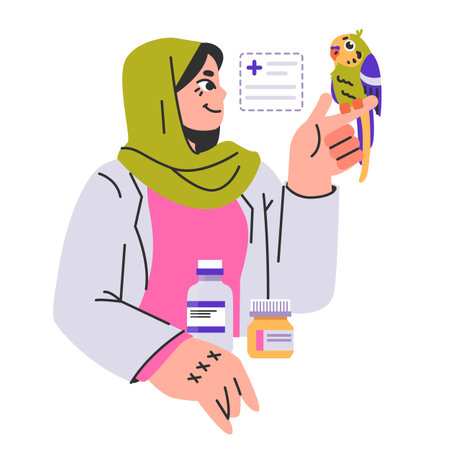1. Understanding Immunization in Senior Pets
As pets age, their immune systems naturally weaken, making them more vulnerable to infections and diseases. While many pet owners assume that older pets no longer need vaccinations, immunization remains a crucial aspect of senior pet care. Understanding how aging affects their immune response helps in making informed decisions about their health.
How Aging Affects the Immune System
Aging impacts the immune system in several ways, leading to a reduced ability to fight off infections. Here are some key changes that occur as pets grow older:
| Immune System Changes | Effects on Senior Pets |
|---|---|
| Weakened immune response | Slower recovery from illnesses and infections |
| Decreased production of antibodies | Less effective protection against diseases |
| Higher susceptibility to chronic conditions | Increased risk of complications from infections |
The Importance of Vaccination for Senior Pets
Even though senior pets may have received vaccinations earlier in life, their immunity can decline over time. Keeping up with recommended vaccinations ensures they remain protected against preventable diseases. Some vaccines may require boosters or adjustments based on a pet’s health condition and lifestyle.
Factors to Consider When Vaccinating Older Pets
- Overall Health: A veterinarian should assess a senior pet’s health before administering vaccines.
- Lifestyle and Exposure Risks: Indoor pets may have different vaccination needs compared to those frequently exposed to other animals.
- Type of Vaccine: Core vaccines (such as rabies) remain essential, while non-core vaccines depend on individual risk factors.
- Potential Side Effects: Older pets may have a higher chance of experiencing mild reactions after vaccination.
The Role of Regular Vet Checkups
A veterinarian plays an essential role in determining the right vaccination schedule for senior pets. Regular checkups allow vets to evaluate their immune status and recommend necessary updates to their immunization plan. Personalized care helps ensure that aging pets stay protected without unnecessary medical interventions.
2. Core vs. Non-Core Vaccines for Older Pets
As pets age, their immune systems may weaken, making vaccinations an essential part of senior pet care. However, not all vaccines are necessary for every pet. Vaccines are categorized into two main types: core and non-core. Understanding the difference between these can help you make the best decisions for your aging furry friend.
Core Vaccines: Essential for All Pets
Core vaccines are those recommended for all pets, regardless of age, lifestyle, or location. These vaccines protect against highly contagious and potentially fatal diseases. For senior pets, maintaining immunity to these diseases is still crucial, though your veterinarian may adjust the frequency based on your pet’s health status.
| Core Vaccine | Protects Against | Recommended for Senior Pets? |
|---|---|---|
| Rabies | A fatal viral disease affecting the nervous system, transmissible to humans | Yes, required by law in most states |
| Canine Distemper (Dogs) | A severe virus affecting respiratory, gastrointestinal, and nervous systems | Yes, boosters may be adjusted based on age and risk |
| Adenovirus (Dogs) | Covers hepatitis and respiratory infections | Yes, but your vet may recommend reduced frequency |
| Parvovirus (Dogs) | A highly contagious and often fatal gastrointestinal virus | Yes, especially if exposure risk remains high |
| PANLEUKOPENIA (Cats) | A severe feline distemper virus that affects blood cells and immune function | Yes, important for continued protection |
| Calicivirus & Herpesvirus (Cats) | Main causes of feline upper respiratory infections | Yes, particularly for cats exposed to other felines |
Non-Core Vaccines: Based on Lifestyle & Risk Factors
Non-core vaccines are optional and depend on a pet’s lifestyle, environment, and potential exposure risks. For senior pets, these vaccines should be considered carefully based on their daily activities and health conditions.
| Non-Core Vaccine | Protects Against | Seniors Who May Need It |
|---|---|---|
| Bordetella (Dogs & Cats) | A bacterial infection causing kennel cough | If frequently boarded, groomed, or around other animals |
| Leptospirosis (Dogs) | A bacterial disease affecting kidneys and liver, transmissible to humans | If exposed to wildlife or standing water outdoors |
| Lyme Disease (Dogs) | A tick-borne illness leading to joint pain and kidney issues | If living in or traveling to areas with high tick populations |
| Feline Leukemia Virus – FeLV (Cats) | A virus weakening the immune system and increasing infection risk | If socializing with other cats or going outdoors often |
| Canine Influenza (Dogs) | A contagious flu-like respiratory disease in dogs | If exposed to dog parks, kennels, or grooming facilities frequently |
Selecting the Right Vaccinations for Your Senior Pet
Your veterinarian will assess your senior pet’s health history, lifestyle, and potential exposure risks when recommending vaccinations. Some older pets may benefit from titer testing—blood tests that measure existing immunity levels—before administering certain vaccines.
Titer Testing: An Alternative Approach?
Titer tests can determine whether a pet still has sufficient immunity from previous vaccinations. If immunity levels are adequate, some vaccines might not be necessary as frequently. This approach helps reduce unnecessary vaccinations while ensuring continued protection.
The Bottom Line: Balance Protection with Health Needs
Seniors need protection against life-threatening diseases while avoiding unnecessary stress on their immune systems. Work closely with your veterinarian to tailor a vaccination plan that prioritizes essential core vaccines while considering non-core options based on lifestyle risks.
![]()
3. Risks and Benefits of Vaccinating Senior Pets
As pets age, their immune system changes, making it essential to weigh the risks and benefits of vaccinations carefully. While vaccines help protect against serious diseases, senior pets may react differently compared to younger animals. Understanding these factors can help pet owners make informed decisions.
Potential Side Effects of Vaccinating Senior Pets
Older pets may experience side effects after vaccinations, ranging from mild to severe. While most reactions are minor, some may require veterinary attention.
| Common Side Effects | Severity | Actions to Take |
|---|---|---|
| Soreness at injection site | Mild | Monitor; usually resolves in a day or two |
| Lethargy or mild fever | Mild to moderate | Allow rest; contact vet if symptoms persist |
| Loss of appetite | Mild | If lasting more than 24 hours, consult a vet |
| Allergic reaction (swelling, difficulty breathing) | Severe | Seek immediate veterinary care |
| Tumor at injection site (rare) | Potentially serious | If lump persists for weeks, consult a vet |
The Benefits of Vaccinating Senior Pets
The primary benefit of vaccinating older pets is disease prevention. Some illnesses, such as rabies and distemper, can be life-threatening, especially for aging animals with weakened immune systems. Additionally, core vaccines may still provide crucial protection depending on your pet’s lifestyle and exposure risks.
Disease Prevention vs. Immunity Considerations
Aging pets may already have long-term immunity from previous vaccinations. In some cases, vets may recommend titer testing to determine whether boosters are necessary.
Important Considerations Before Vaccination
- Your Pet’s Health Status: If your pet has chronic conditions like kidney disease or arthritis, discuss vaccine safety with your veterinarian.
- Lifestyle Factors: Indoor pets with minimal exposure to other animals may not need all the same vaccines as outdoor or social pets.
- Titer Testing: This blood test measures existing immunity levels and can help determine if a booster shot is needed.
- Your Vet’s Recommendation: Always consult with your veterinarian before making vaccination decisions for your senior pet.
A Tailored Approach to Senior Pet Vaccination
No one-size-fits-all approach exists for vaccinating senior pets. By considering their health history, potential risks, and lifestyle, you can work with your vet to create a vaccination plan that best suits your aging companion.
4. Alternatives to Traditional Vaccination
As pets age, their immune systems change, and traditional vaccination schedules may not always be the best approach. Fortunately, there are alternative methods to ensure your senior pet remains protected without unnecessary vaccinations. These options can help tailor healthcare plans to meet the specific needs of older pets.
Titer Testing: Measuring Immunity Levels
Titer testing is a blood test that measures the level of antibodies in your pet’s system. This helps determine whether your senior pet still has immunity from previous vaccinations or if they need a booster.
| Pros of Titer Testing | Cons of Titer Testing |
|---|---|
| Avoids unnecessary vaccinations | Can be more expensive than routine vaccines |
| Reduces the risk of vaccine-related side effects | Might not be available at all veterinary clinics |
| Helps make informed decisions about boosters | Does not measure immunity for all diseases |
Holistic Preventive Care Options
Apart from vaccines, there are other ways to support your senior pet’s immune system and overall health.
Proper Nutrition and Supplements
A well-balanced diet with essential vitamins and minerals helps maintain a strong immune system. Some senior pets may also benefit from supplements such as probiotics, omega-3 fatty acids, and antioxidants.
Regular Veterinary Check-Ups
Semi-annual vet visits allow for early detection of health issues and provide an opportunity to discuss vaccination alternatives with your veterinarian.
Parasite Prevention
Avoiding infections from fleas, ticks, and worms is crucial for maintaining good health in senior pets. Preventative medications can help protect them year-round.
5. Consulting Your Veterinarian for a Personalized Plan
As your pet gets older, their immune system changes, and so do their vaccination needs. Instead of following a one-size-fits-all schedule, senior pets benefit from a more customized approach. That’s why it’s essential to work closely with your veterinarian to develop a vaccination plan that keeps your aging companion healthy while minimizing unnecessary risks.
Why a Personalized Vaccination Plan Matters
Senior pets often have different medical histories, chronic conditions, and lifestyle factors that influence their immunity. A personalized vaccination schedule takes these factors into account to ensure they receive only the vaccines they truly need.
Factors Your Vet Will Consider
| Factor | How It Affects Vaccination |
|---|---|
| Age | Older pets may have weaker immune responses and might not need as frequent boosters. |
| Health Conditions | Chronic illnesses like kidney disease or arthritis can impact vaccine recommendations. |
| Lifestyle & Exposure Risk | A pet that stays indoors may require fewer vaccines than one that frequently interacts with other animals. |
| Pervious Vaccination History | If your pet has received core vaccines throughout their life, they may already have long-term immunity. |
The Importance of Regular Veterinary Check-Ups
Your vet visits aren’t just about vaccinations—theyre an opportunity to assess your pet’s overall health and catch potential issues early. Routine check-ups help ensure that any vaccine given is safe and necessary based on your pet’s current condition.
Questions to Ask Your Veterinarian
- Does my senior pet still need all core vaccines?
- Are there any risks associated with vaccinations at this age?
- Can we perform titer testing to check immunity levels?
- How do my pet’s current medications or conditions affect vaccination?
- What are the signs of adverse reactions I should watch for?
Titer Testing: An Alternative to Automatic Boosters
If youre unsure whether your senior pet needs another round of shots, ask your vet about titer testing. This blood test measures antibody levels in your pets system to determine if they still have immunity against certain diseases. If antibody levels are sufficient, additional vaccinations may not be necessary.
Benefits of Titer Testing:
- Avoids unnecessary vaccinations and potential side effects.
- Takes a scientific approach to determining immunity.
- Makes vaccination decisions based on actual needs rather than standard schedules.
Your senior pet deserves the best care possible, and that means making informed decisions about their health. By working with your veterinarian to create a personalized vaccination plan, you can ensure they stay protected without unnecessary risks. Schedule regular check-ups and discuss the best course of action tailored to your furry friend’s unique needs.


